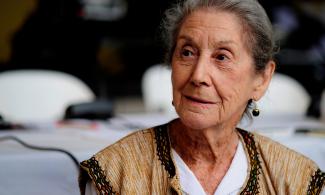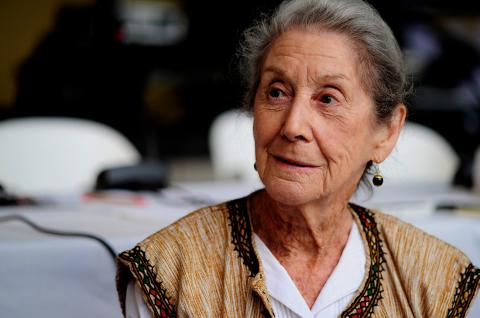
(The famous author of July’s People, departs in the month of July)

There is a story my friend Syl Cheney-Coker, the noted Sierra Leonean writer, likes to tell and tell again: that of his first meeting with Nadine Gordimer. It happened slightly over 20 years ago in Harare at a UNESCO-sponsored conference designed to facilitate dialogue between South African writers and intellectuals and their counterparts from other parts of the continent within the context of a South Africa just emerging from the throes of Apartheid. Nadine Gordimer had spotted Syl Cheney-Coker in the crowd, hailed him enthusiastically, and walked briskly up to him. ‘Let me congratulate you on The Last Harmattan of Alusine Dunbar’, she said, her voice steady, her sentiment sincere, ‘it is, indeed, a major novel’.
You may be wondering why Cheney-Coker finds this story so significant and why I find it so joyously tellable. Afterall, he is no new writer hungry for validation and endorsement; and the likes of Gordimer’s positive remarks he must have heard several times from other sources. But the fact is that this appreciation came from Nadine Gordimer, a Nobel laureate in literature and one of the world’s most significant writers; and she offered it with a gracious ease and unforced generosity rare among established writers of her calibre in their dealings with their younger, less known counterparts. It is one episode that speaks volumes about the philosophy, character, and comportment of a writer for whom humility is no gimmick, and accessibility is no device. There is something about the gentle gaze of Nadine Gordimer, something about her vibrant warmth and careful attentiveness that put her interlocutor at instant ease. This was my experience on the two occasions on which I met her – the first at a crowded literary festival in London in 1995, the second in January 2007 at a smaller, more exclusive forum: The Grinzane Cavour International Conference on Sub-Saharan African Literature in Torino, Italy.
Our Torino meeting took place just weeks after she had been attacked and robbed at her Johannesburg home, and the whole world had recoiled in horror over the gruesomeness of her ordeal; but throughout our conversation, Gordimer displayed no bitterness; she saw nothing exceptional about her affliction and made no case for special treatment. When, during our conversation, she said ‘we Africans’, she did so with a disarming air of un-self-consciousness and credible inclusiveness.
A highly conscientious writer and revolutionary humanist who spent most of her productive years in Apartheid South Africa, she committed both her artistic talent and political acumen to a long and single-minded struggle against her country’s odious ideology of racial exploitation and oppression. As a Jew, she was no stranger to a history of racial segregation and the unspeakable evil that is always its (il)logical outcome. So she joined the anti—Apartheid African National Congress, ANC, at a time it was considered both unwise and unsafe to do so; and when Apartheid was brought to its knees and the ANC assumed the reins of power, she became one of the most conscientious critics of its lapses. She was a strong believer in the truism that evil is colour-blind, and so the fight against it has to be equally unbiased. Like the unforgettable Ruth First who was letter-bombed by the Apartheid regime for her Human Rights activism, Nadine Gordimer was held in high esteem by Nelson Mandela and regarded with comradely respect by the rank and file of the ANC.
In the hallowed tradition of Chinua Achebe, Ngugi wa Thiog’o, Nawal El Saadawi, and Ama Ata Aidoo, Gordimer appreciated the inseparability of art and politics, and the need to achieve a reasonable balance between the two. She told the world without any equivocation that her very existence as the citizen of a racist society had placed an inexorable responsibility on her art since there was no way she could shut out this grim reality from her creative consciousness and her literary output. In work after work, and in delightfully delicate prose, she exposed the hideous horrors of the Apartheid system and the fatal illogicality of its anti-human ideology. Consequently, some of her books were banned, unbanned, and banned again.
From very early in her literary career, she commanded the world’s attention through the gripping relevance of her subject-matter as well as the felicity of her style. A patient mentor and unobtrusive instructor to many young, aspiring writers, she demonstrated the need to get literature to speak the language of our pain without forgetting the possibility of our hope. Her preface to Oswald Mbuyiseni Mtshali’s Sounds of the Cowhide Drum supplied the wings with which that remarkable collection of poems flew across the world, while her encouragement to Nigeria’s Ikeogu Oke provided the needed boost for a promising writing career. To Gordimer, literature is armed struggle by another name. In many ways, the efforts of artists like her constituted a vital creative-ideational wing of the ANC’s military campaign. The proverbial Spear of the Nation also carried a metal nib.
Her deep humanist impulse and exceptional literary accomplishments did not go unnoticed by a grateful world. She won the 1974 Booker Prize for her novel The Conservationist, and the Nobel Prize in 1991. Her last novel, No Time Like the Present (2012), takes a hard, unsparing look at post-Apartheid South Africa, and in the unparaphraseable wording of Gillian Slovo, it is a complex work which grapples with ‘the difficulties posed by a freedom that was won by imperfect human beings’ The Guardianonline, Friday 23 Mach, 2012).
Gentle and caring, petite and deceptively fragile, Nadine Gordimer was a consistent dynamo whose moral energy electrified our darkness. For her, Humanity (note the upper-case ‘H’) is one, indivisible. With rugged courage and complex but tenacious optimism, she committed her entire life and works to the vision of a world of human beings who respect one another, a world undiminished by the incubi of race and gender and class. Here goes a writer that was never afraid of dreaming and doing. Here goes a visionary for whom the rainbow was hardly enough.
Niyi Osundare
Ibadan
July 18, 2014